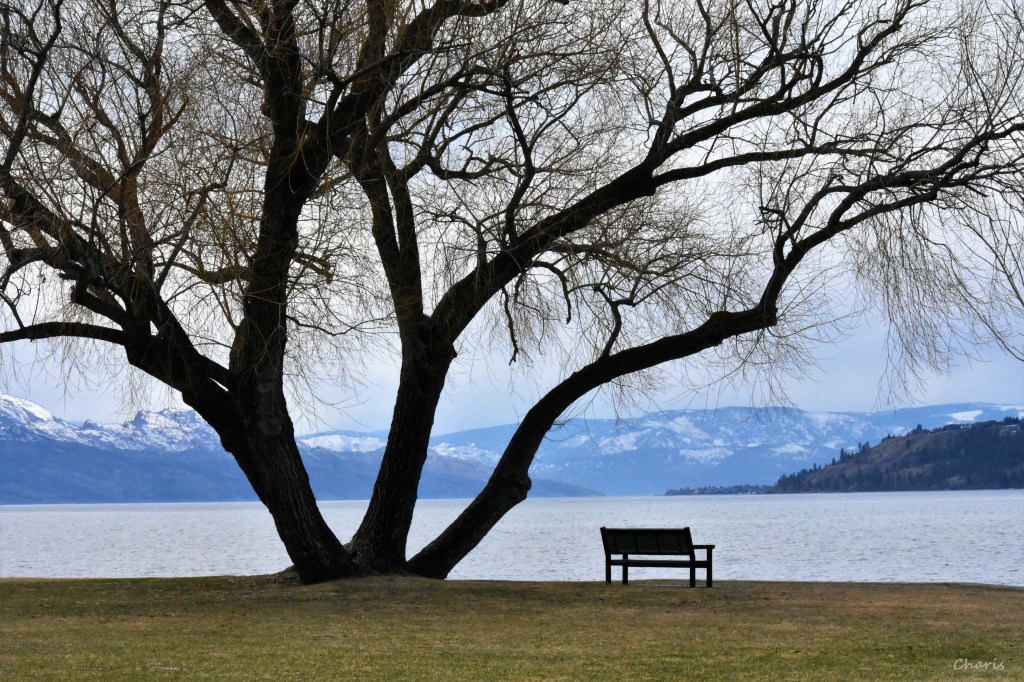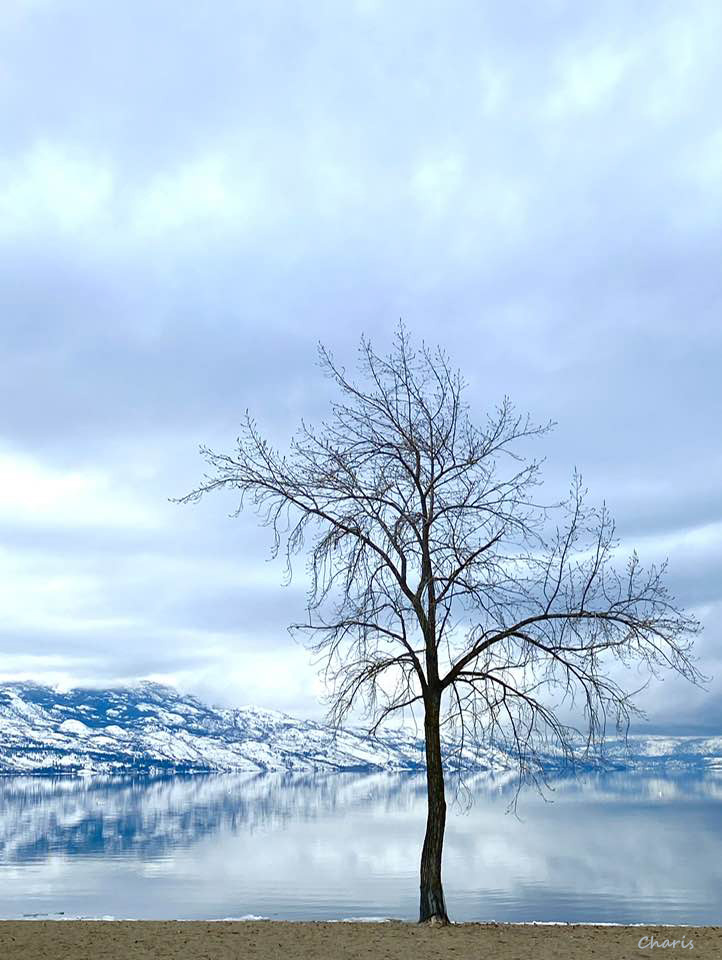Even in winter it shall be green in my heart.
Frederic Chopin
Category: Winter
Ruthless Love

“Romantic love is blind to everything except what is lovable and lovely, but Christ’s love sees us with terrible clarity and sees us whole. Christ’s love so wishes our joy that it is ruthless against everything in us that diminishes our joy. The worst sentence Love can pass is that we behold the suffering which Love has endured for our sake, and that is also our acquittal. The justice and mercy of the judge are ultimately one.”
Frederick Buechner
In-between

It is always the liminal spaces, those threshold in-between places in our lives, where old things pass away and new things have yet to emerge, where we face our greatest challenges and have opportunity to experience our greatest learning.
-Mark Chironna
The cold weather fell so suddenly this year that the leaves on the trees in the park did not have time to sing their final, colourful adio. They froze mid-roulade and missed their chance to exit to applause before the audience went home. Now they fall, unnoticed, on the dusty, crusty January snow.
Sometimes seasons march out in a grand finale. Sometimes they slink away slowly, finally noticing their time has passed.
Like the leaves, I am reluctant to let go. At the moment, the potential of the next season feels like a sodden weight of too many options, too many yeah-buts, and too little energy. But this is where the future is born –in quietness and rest. There is a rich feast of wisdom and revelation to be found in this season.
This is the time of the in-between.
By the Waters of Comfort
Relieve and comfort all the persecuted and afflicted;
speak peace to troubled consciences;
strengthen the weak;
confirm the strong;
instruct the ignorant;
deliver the oppressed from him that spoileth him;
and relieve the needy that hath no helper;
and being by us all, by the waters of comfort,
and in the ways of righteousness,
to the Kingdom of rest and glory,
through Jesus Christ our Lord.
-Jeremy Taylor
I sat in a waiting room this week. I knew before I got there the wait would be long. The day after Christmas and New Years holidays were over had a fun-is-done back-to-business feeling at the medical lab. It may have been business-like, but there were so many feelings swirling about in that room.
Legal measures taken to protect patient privacy are trumped by thin curtains between beds or loud conversations between patients and a masked receptionist behind a plexiglass wall. It reminds me of a scene from the old comedy show “Get Smart” when secret agents are covered by a “cone of silence” which required them to yell because they couldn’t hear each other. When the plexiglass wall of silence is in the middle of a crowded waiting room, all pretense of privacy is gone.
Some people are mortified at having to explain what is in the sample bottle they are dropping off and they avoid eye contact with other humans for the rest of the day. Others don’t seem to care. In fact, some people give their information freely (and repeatedly due to the impediments to communication). Then they take a number, sit down, and look for someone to tell their troubles to. There are a lot of troubles expressed in a crowded waiting room at the hospital lab in the week after the holidays.
I’m not good at blocking the sights and sounds out. I’ve been given advice on how to ignore sad stories whether they are told in winces and groans or given in long detailed descriptions, but I know what it is like to cry and not be heard. So I listen. It’s something I actually like about myself, so I’m not likely to take the advice to block people out. I can’t imagine a caring Jesus blocking out people out. Prioritizing getting away to a quiet place where he could hear his Father’s voice? Yes, but not by pretending he didn’t notice or treating people as if their stories were not important. He always brought encouragement.
It’s the getting away to be heard by our heavenly Father, and to listen to His peace and kindness that heals our own souls and allows us to walk in hope in the middle of hopelessness. The comfort he has given us is shareable. It’s called compassion.
Earlier, while waiting for my husband at his own appointment, I was able to stop by the lake on a cool cloudy January day. There, by the waters of comfort, I found peace in the presence of the Lover of my soul. I could continue a day of tests of various types knowing, no matter what, I am loved and therefore able to extend love. And when I’m running low, I’m learning there’s plenty more where that came from.
Midwinter
In the silence of a midwinter dusk, there is a sound so faint that for all you can tell it may be only the sound of the silence itself. You hold your breath to listen. You are aware of the beating of your heart. The extraordinary thing that is about to happen is matched only by the extraordinary moment just before it happens. Advent is the name of that moment.
-Frederick Buechner
The Road Back: Psalms of the Sons of Korah, Righteousness and Peace Kiss Each Other
I appreciate the candour expressed in the Psalms of the Sons of Korah. In Psalm 84 they are experiencing the glory of the Lord and the beauty of being in his presence and going from strength to strength. In Psalm 85 they recognize that a distance has crept into their relationship with God. They are again falling back into the old default position of relating to him as an angry God. They cry out for revival, a fanning of embers that seem to be slowly losing their fire.
I’ve been there. Have you? As I’ve been meditating on this Psalm, I believe I am beginning to see a kind of map for renewing the desire to get back to the place of passionate love for the Lover of our souls. It looks like this:
-Worship God by choosing to focus on who he is and remembering what he has done.
-Assess the current state of your relationship and tell him how you feel. Honestly.
-Ask for what you need.
-Listen to his heart and pay attention to his many ways of communicating insight.
-Learn from his advice and seek ways to let it change you.
-Declare the outcome of what he has shown you.
Here it is in Psalm 85:
Worship and Remember
You, Lord, showed favor to your land;
you restored the fortunes of Jacob.
You forgave the iniquity of your people
and covered all their sins.
You set aside all your wrath
and turned from your fierce anger. (verses 1 to 3 NASB)
Assess and tell him how you feel
Restore us again, God our Savior,
and put away your displeasure toward us.
Will you be angry with us forever?
Will you prolong your anger through all generations? (verses 4 and 5)
Ask
Will you not revive us again,
that your people may rejoice in you?
Show us your unfailing love, Lord,
and grant us your salvation. (verses 6 and 7)
Listen
I will listen to what God the Lord says;
he promises peace to his people, his faithful servants—
but let them not turn to folly.
Surely his salvation is near those who fear him,
that his glory may dwell in our land. (verses 8 and 9)
Learn
Love and faithfulness meet together;
righteousness and peace kiss each other.
Faithfulness springs forth from the earth,
and righteousness looks down from heaven. (verses 10 and 11)
Declare
The Lord will indeed give what is good,
and our land will yield its harvest.
Righteousness goes before him
and prepares the way for his steps. (verses 12 and 13)
I wondered what was meant by the psalmists use of the metaphor of righteousness and peace kissing each other. (verse 10) That lead me to do a word study.
The word translated kiss here is nashaq. This kind of kiss means a great deal more than romance or affection. We have difficulty understanding this kind of kiss in that culture. It’s not a western custom. The Bible describes the kiss of restoration of relationship when Esau kissed Jacob. The word nashaq is used for the public mark of authority Pharoah granted Joseph to prepare the land for coming famine (Genesis 41:40). We read it again when Israel gave his final blessing to his sons and grandsons. It is used when Aaron went out to meet his younger brother, Moses, as a sign of recognition of, and submission to, his calling (Exodus 4:27). It is used when describing the prophets who refused to kiss an idol and refused to give Baal any acknowledgment of authority or influence in their lives.
A nashaq kiss can symbolize a fastening to someone. It can indicate a restoration of order in relationships. Sometimes it was symbolic of a formal equipping with authority that could include power or weapons. This authority is publicly conferred upon the person receiving the kiss.
When love and faithfulness meet, righteousness and peace kiss each other. They form a bond which is mutually empowering. Righteousness that comes from God the Father through Jesus Christ makes peace possible. The peace that Jesus gives is beyond understanding, but it enables righteousness to replace shame and guilt. Both, together, give us a place and a standing in the family of God, not by anything we have accomplished, but by God’s grace.
Faith-fullness (which also comes from God) gives us a means to receive and something to offer back to our heavenly Father. His response, his ‘anah (explained here), to our prayer made in faith that he will hear and answer, is the righteousness of Christ which came down from heaven. When we are born again, it is Christ’s in which we live and move and have our being. It is his righteousness which went before and prepared his steps and now goes before and prepares our steps toward greater intimacy with our Creator.
Because of God’s response to our earnest cries for his unfailing love to revive us again, we can declare with confidence, “The Lord will indeed give what is good, and our land will yield its harvest!”
I don’t know about you, but I have some talkin’ to do with the Lord. If you want to join me in worshipping, expressing, asking, listening, learning, and declaring restoration and revival for your own heart, for your family, for your household of faith, for your community or city, for your country and for the world, you are welcome.
The Road Back: Psalms of the Sons of Korah, Why Should I Fear When Evil Days Come?
For thousands of years, people who have had the most possessions have been in positions to buy power. That fact is obvious. We’ve seen evidence that “Money talks,” and, “He who pays the piper calls the tune.” We are all aware of evil around us that is financed by those who trust in themselves more than anyone else.
Before the Messiah showed up, not many people were in on the secret that God’s plan of salvation involved the poor and lowly people in this world. Young pregnant Mary was. One of my favourite pieces of music is her prophetic poem recorded in Luke 1, “The Magnificat,” which J.S. Bach set to music. It includes an aria for contralto with these lyrics: Esurientes implevit bonis et divites dimisit inanes. (The hungry he has filled with good things, and the rich he has sent away empty.)
The Sons of Korah understood before Mary did. After returning to the role intended for them, they spent their days worshipping in God’s presence in the temple. They were in a position to hear God’s voice. The introduction to Psalm 49 includes these lyrics:
My mouth will speak words of wisdom;
the meditation of my heart will give you understanding.
I will turn my ear to a proverb;
with the harp I will expound my riddle:
The words of wisdom were these:
Why should I fear when evil days come,
when wicked deceivers surround me—
those who trust in their wealth
and boast of their great riches?
No one can redeem the life of another
or give to God a ransom for them—
the ransom for a life is costly,
no payment is ever enough—
so that they should live on forever
and not see decay.
(Psalm 49: 4-9 NIV)
No one, even Solomon in all his glory, was rich enough to ransom a soul from Sheol. We all die, and our wealth is useless at the most important moment of all eternity. “This is the fate of those who trust in themselves, and of their followers, who approve their sayings.” (verse 13)
And yet the psalmists knew God had plans to pay the price and that someday they would see the manifestation of this promise: “But God will redeem me from the realm of the dead; he will surely take me to himself.” (verse 15)
I don’t know about you, but I get a bit scared when I see evidence of the days growing darker. Sometimes I feel helpless under the influence of evil people who do what they like and cover it over by buying good P.R.. But this is nothing new. I’m reassured by the Sons of Korah, who invite us to step back and see a bigger picture. In the end, material wealth and self-reliance fails spectacularly. Only God could pay the price for a soul. Only Jesus, who is both the baby crying in a manger, and the King of Kings who conquered death, could afford to give us eternal life.
“Esurientes” has a playful flute duet weaving around the sound of the voice. It feels like a dance of joy popping out in hopeful measures with the humour of an inside joke., “The hungry he has filled with good things and the rich he has sent away empty!”









